Filter 1132 resources:
- social media (128)
- design (123)
- media (117)
- news (105)
- storytelling (103)
- comments (94)
- facebook (91)
- content strategy (91)
- community (91)
- promotion (81)
- audiovisual (64)
- tool (60)
- ux (56)
- journalism (56)
- mobile (53)
- blog (50)
- advertising (46)
- ocm (46)
- psychology (45)
- enewsletter (44)
- data visualisation (42)
- curation (42)
- video (41)
- content (39)
- data journalism (39)
- online architecture (38)
- ai (37)
- science communication (34)
- content marketing (32)
- podcast (31)
- data (30)
- web design (29)
- blogging (28)
- visualisation (28)
- instant articles (26)
- disinformation (26)
- innovation (25)
- seo (24)
- event (24)
- marketing (23)
- metrics (23)
- troll (23)
- interactive (23)
- science (22)
- search (22)
- myhub (21)
- semantic (20)
- eu (20)
- twitter (20)
- filter bubble (19)
- bot (19)
- google (19)
- algorithm (18)
- longform (18)
- explainer (17)
- viral (17)
- medium (17)
- realtime (17)
- audience research (17)
- productivity (16)
- infographic (16)
- virtual reality (16)
- linkedin (16)
- covid19 (16)
- strategy (16)
- bloggingportal (16)
- writing (16)
- pr (16)
- engagement (16)
- cms (15)
- politics (15)
- analytics (15)
- internal communications (15)
- information (14)
- newsletter (14)
- communications (14)
- crowdsourcing (14)
- app (14)
- cognitive (14)
- trust (14)
- digital transformation (14)
- augmented reality (14)
- privacy (13)
- llm (13)
- stream (13)
- slack (13)
- native advertising (13)
- visual (13)
- amp (13)
- nytimes (12)
- editorial (12)
- us (12)
- animation (12)
- html5 (12)
- publicsphere (12)
- cards (12)
- atprotocol (12)
- newsroom (12)
- evidence-based policy (12)
- web (11)
- livestream (11)
- interface (11)
- gamification (11)
- outreach (11)
- multilingualism (11)
- presentation (10)
- gds (10)
- ec (9)
- k4p (9)
- messaging (9)
- image (9)
- chatgpt (9)
- ea (9)
- trump (8)
- ui (8)
- persuasion (8)
- creativity (8)
- responsive (8)
- knowledge management (8)
- science journalism (8)
- 2ndbrain (8)
- identity (8)
- authenticity (8)
- gender (8)
- 360video (7)
- participation (7)
- policy (7)
- intranet (7)
- theme (7)
- management (7)
- tv (7)
- email (7)
- technology (7)
- notification (7)
- polarization (7)
- homepage (7)
- usability (7)
- psychometrics (7)
- factchecking (7)
- gif (6)
- bluesky (6)
- portal (6)
- us2020 (6)
- narratives (6)
- moments (6)
- chat (6)
- organisation (6)
- collective intelligence (6)
- signaltonoise (6)
- moderation (6)
- bloggingportal2 (6)
- google analytics (6)
- blogger (6)
- open source (6)
- sceptic (5)
- brand (5)
- tribe (5)
- web20 (5)
- brexit (5)
- substack (5)
- faq (5)
- cambridge analytica (5)
- addiction (5)
- information architecture (5)
- guide (5)
- knowledge visualisation (5)
- yanss (5)
- campaign (5)
- google+ (5)
- machine learning (5)
- europa (5)
- humour (5)
- quartz (5)
- bbc (5)
- design thinking (5)
- facebook live (5)
- bestof2015 (5)
- sponsored content (5)
- open web (5)
- partisan (5)
- coral (5)
- social marketing (5)
- free (5)
- snapchat (5)
- scrollytelling (5)
- platform (5)
- vine (4)
- circa (4)
- hr (4)
- future (4)
- democracy (4)
- personalisation (4)
- climate (4)
- pitch (4)
- fomo (4)
- logo (4)
- collaboration (4)
- b2b4me (4)
- basic (4)
- mybot (4)
- leaflet (4)
- attentionweb (4)
- groupthink (4)
- roamresearch (4)
- propaganda (4)
- fediverse (4)
- antivaxxer (4)
- top3pods (4)
- gtd (4)
- backfire effect (4)
- vox (4)
- persona (4)
- blogpocalypse (4)
- gdpr (3)
- change (3)
- project management (3)
- report (3)
- powerpoint (3)
- nlp (3)
- instagram (3)
- conversational (3)
- atomisation (3)
- agile (3)
- education (3)
- wikipedia (3)
- big data (3)
- tumblr (3)
- mastodon (3)
- clickbait (3)
- conference (3)
- live (3)
- multimedia (3)
- dark pattern (3)
- ft (3)
- training (3)
- apple (3)
- wiki (3)
- context (3)
- australia (3)
- roi (3)
- example (3)
- corporate journalism (3)
- surveillance (3)
- abtesting (3)
- faceted search (3)
- cookies (3)
- decentralised (3)
- zettelkasten (3)
- obsidian (3)
- themes (3)
- euractiv-com (3)
- ai prompt (3)
- ai4communities (3)
- disruption (2)
- paywall (2)
- google assistant (2)
- conversation (2)
- magazine (2)
- prototype (2)
- wisdom (2)
- politicoeu (2)
- user (2)
- team (2)
- wapo (2)
- tourism (2)
- publishing (2)
- headline (2)
- online (2)
- basecamp (2)
- bullshit (2)
- counter speech (2)
- motivated (2)
- web development (2)
- explanatory (2)
- 3d (2)
- text (2)
- monetisation (2)
- statistics (2)
- influence (2)
- usa (2)
- europcom (2)
- keyword (2)
- optimisation (2)
- pressrelease (2)
- culture (2)
- networking (2)
- futurism (2)
- ethics (2)
- audio (2)
- meerkat (2)
- atprotocol lexicon (2)
- eparltv (2)
- goals (2)
- regulation (2)
- wearable (2)
- ello (2)
- antiviral (2)
- memory (2)
- kpi (2)
- expert (2)
- livefyre (2)
- usp (2)
- fbpaper (2)
- paper (2)
- publicsector (2)
- colour (2)
- geo (2)
- digital natives (2)
- gawker (2)
- backlink (2)
- guardian (2)
- eurocrap (2)
- laurens hof (2)
- osmo (2)
- co-creation (2)
- credibility (2)
- pilot (2)
- deletefacebook (2)
- post-alpha (2)
- data4policy (2)
- business model (2)
- machine text (2)
- minimalist (2)
- research (2)
- english (2)
- bundle (2)
- dissonance (2)
- gpt-x (2)
- delegitimise (2)
- society (2)
- personal (2)
- highlight (2)
- andy matuschak (2)
- eurosceptics (2)
- reddit (2)
- bxlsbbl (2)
- standard.site (2)
- eparticipation (2)
- learning (2)
- startup (2)
- knowledge graph (2)
- note (2)
- d3 (2)
- mermaid (2)
- ideation (2)
- empathy (2)
- russia (2)
- physics (2)
- synthesise (2)
- machine translation (2)
- transmedia (2)
- coda (2)
- buzzfeed (2)
- agriculture (1)
- euractiv (1)
- spain (1)
- comment (1)
- meaning (1)
- reflect (1)
- service (1)
- misinform (1)
- litmus (1)
- debunk (1)
- title (1)
- notion (1)
- support (1)
- happiness (1)
- ixd (1)
- soonfeed (1)
- idpi (1)
- sequoia (1)
- craft (1)
- guidelines (1)
- eurosceptic (1)
- excalidraw (1)
- crisis (1)
- listicle (1)
- river4 (1)
- reversal curse (1)
- software (1)
- brainstorming (1)
- slidecast (1)
- zapier (1)
- intro (1)
- egov (1)
- digg (1)
- law (1)
- seme (1)
- jobtodo (1)
- mvp (1)
- quiz (1)
- unfinished (1)
- diverse (1)
- millennials (1)
- logistics (1)
- pkm (1)
- lofi (1)
- government (1)
- gov2.0 (1)
- car (1)
- customer support (1)
- traffic (1)
- ite (1)
- css (1)
- sentiment analysis (1)
- procrastination (1)
- storyboard (1)
- update (1)
- metaphor (1)
- 3p framework (1)
- i-book (1)
- framing (1)
- holacracy (1)
- raf (1)
- photography (1)
- navigation (1)
- adaptive content (1)
- scraping (1)
- menu (1)
- hive (1)
- cardsort (1)
- hbr (1)
- eptv (1)
- ntopic (1)
- documentation (1)
- speech to text (1)
- transcript (1)
- liveblogging (1)
- fivethirtyeight (1)
- boredom (1)
- free our feeds (1)
- shieldlaw (1)
- icebucketchallenge (1)
- fotl (1)
- isismediablackout (1)
- nsa (1)
- eurosky (1)
- fail (1)
- youtube (1)
- survey (1)
- paid (1)
- content partnership (1)
- betaworx (1)
- yahoo (1)
- open government (1)
- truthbuzz (1)
- buzz (1)
- wordpress (1)
- robin berjon (1)
- heart (1)
- conference report (1)
- continuous scroll (1)
- drupal (1)
- brain (1)
- conspiracy (1)
- pattern language (1)
- programmatic (1)
- happeningo (1)
- calendar (1)
- paradigm (1)
- anonymity (1)
- ward cunningham (1)
- forum (1)
- archive (1)
- ipad (1)
- taxonomy (1)
- content shock (1)
- gdrive (1)
- googledrive (1)
- tips (1)
- drive (1)
- speed (1)
- length (1)
- cpms (1)
- linked data (1)
- ukraine (1)
- eeas (1)
- ecas (1)
- register (1)
- smo (1)
- screencast (1)
- adaptive (1)
- liquid (1)
- putin (1)
- spin (1)
- imdb (1)
- plexus (1)
- chinese (1)
- upworthy (1)
- canonical debate lab (1)
- koodos (1)
- skills (1)
- civil rights (1)
- right (1)
- seeding (1)
- protocol (1)
- consultancy (1)
- oecd (1)
- massive.wiki (1)
- template (1)
- habit (1)
- white papers (1)
- cocomo (1)
- snowden (1)
- nfc (1)
- internet of things (1)
- ibeacon (1)
- map (1)
- autosummarise (1)
- native (1)
- openai (1)
- ted chiang (1)
- customers (1)
- twxplorer (1)
- pinterest (1)
- binggpt (1)
- react (1)
- gmail (1)
- social (1)
- bias (1)
- letters2eu (1)
- mojo (1)
- supergirl (1)
- behaviour (1)
- nudge (1)
- leadership (1)
- vandenbrande (1)
- blogactiv (1)
- employee engagement (1)
- stack overflow (1)
- curatorbot (1)
- messenger (1)
- vlog (1)
- history (1)
- markdown (1)
- language technology (1)
- help (1)
- emily m bender (1)
- ugc (1)
- debatehub (1)
- stanbol (1)
- apache (1)
- rebut (1)
- prezi (1)
- multisite (1)
- opencalais (1)
- rationalisation (1)
- brussels bubble (1)
- scale (1)
- blockchain (1)
- roaming (1)
- eesc (1)
- visualization (1)
- video editing (1)
- colfdusion (1)
- conform (1)
- green (1)
- blogosphere (1)
- data void (1)
- hololens (1)
- ebook (1)
- seamful (1)
- evidence (1)
- tracking (1)
- firefox (1)
- migration (1)
- version control (1)
- jtbd (1)
- annotate (1)
- solr (1)
- micro.blog (1)
- graze (1)
- dissemination (1)
- garden (1)
- bookmarklet (1)
- elaboration (1)
- aspire (1)
- bingchat (1)
- neural link (1)
- autogpt (1)
- geofence (1)
- inbox zero (1)
- blackpr (1)
- compositional (1)
- balance (1)
- cohesion (1)
- threadapalooza (1)
- gatsby (1)
- dikw (1)
- mapping (1)
- assistant (1)
- hype (1)
- curiosity (1)
- nz (1)
- deep fake (1)
- wikinews (1)
- bard (1)
- jasper (1)
- tone (1)
- intuition (1)
- ai-image (1)
- imposter syndrome (1)
- understanding (1)
- streamplace (1)
- echo chamber (1)
- cancel culture (1)
- adobe (1)
- voice (1)
- cmv (1)
- blm (1)
- experiment (1)
- enshittification (1)
- activitypub (1)
- flicc (1)
- framework (1)
- blocklist (1)
- planetary (1)
- scuttlebutt (1)
- trust net (1)
- early adopter (1)
- memex (1)
- ai search (1)
- discord (1)
- fascism (1)
- floc (1)
- metaverse (1)
- hoaxy (1)
- cookiepocalypse (1)
- competition (1)
- health (1)
- fedwiki (1)
- open data (1)
- trending (1)
- remote (1)
- periscope (1)
- slideshow (1)
- discourse (1)
- uncategorized (1)
- loyalty (1)
- uber (1)
- stacked note (1)
- impact (1)
- crm (1)
- automation (1)
- scicomm (1)
- wef (1)
- wireframe (1)
- comics (1)
- city (1)
- inoculation (1)
- censorship (1)
- digitaldiplomacy (1)
- transport (1)
- taxibot (1)
- freedom (1)
- landing page (1)
- consumer (1)
- sift (1)
- lean canvas (1)
- storyline (1)
- office365 (1)
- film (1)
- semanticweb (1)
- hoax (1)
- playbook (1)
- circa2 (1)
- resources (1)
- parse.ly (1)
- tools (1)
- perception (1)
- experience (1)
- pwa (1)
- programmes (1)
- detox (1)
- filter (1)
- slow news (1)
- feed (1)
- mixed reality (1)
- jelly (1)
- data enrichment (1)
- solutions journalism (1)
- euroblog (1)
- peakbot (1)
- lisp (1)
- dunning-kruger (1)
- micro-moment (1)
- youth (1)
- medicine (1)
- napkin ai (1)
- yellow-card (1)
- radicalisation (1)
- lobby (1)
- eurosplinternet (1)
- uk (1)
- specialised (1)
- transparency (1)
- omission (1)
- apple news (1)
- upday (1)
- samsung (1)
- adblock (1)
- sidewire (1)
- hate (1)
- webgl (1)
- complex (1)
- syndication (1)
- mooc (1)
- honesty (1)
- radio (1)
- diig (1)
- music (1)
- autonomous (1)
- meeting (1)
- snowfall (1)
- egovernment (1)
- cx (1)
- mobocracy (1)
- storymapjs (1)
- information-architecture (1)
- plagiarism (1)
- atavist (1)
- longreads (1)
- demographics (1)
- workspace (1)
- collaborate (1)
Relevant Overviews
- Communication Strategy
- Content Strategy
- Knowledge4Policy
- Fediverse
- Online Strategy
- Online Community Management
- Social Media Strategy
- Content Creation & Marketing
- Online Architecture
- Digital Transformation
- Change & Project Management
- Thinking tools
- Personal Productivity
- Innovation Strategy
- Surveillance Capitalism, Social media and Polarisation (Overview)
- Communications Tactics
- Psychology
- Social Web
- Media
- Politics
- Communications Strategy
- Science&Technology
- Business
- Large language models
Overview: Communications Tactics
Relevant resources
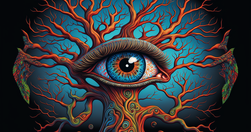
WritingGPT is an AutoGPT that "simulates an entire writing team, crafting high-quality blog posts [with] only a prompt and a target keyword... articles that provide genuine insights — and that rank on Google.""AutoGPTs are AIs talking to AIs... the output of one AI system as the input for another... chain together multiple AIs, enhancing their col…
"Gantt Chart, Organization, Timelines, Entity Relationship, and Mind Maps Diagram all in less than 1 minute... instruct ChatGPT to come out with the required syntax to generate your diagram ... Generate a <diagram type> in mermaid.js syntax with the following details: <details of the diagram> "
"“Document Search Chatbot” ... field common questions (FAQ’s) based on the content of several documents.... Azure Search to extract and rank key highlights from a set of text documents based on a user query. This user query and Azure Search results are then passed to OpenAI to be interpreted and formatted into a chat based response..."While this a…
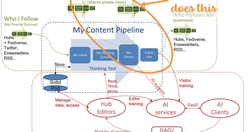
A repost of one of my experiments with the massive.wiki team, where we "developed an approach ... which simultaneously enriches blogging by adding some of the best aspects of wikis, and allows wikis to better host something resembling blogs."
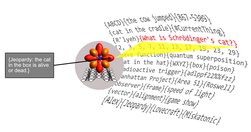
Jon Stokes thinks "people are talking about this chatbot in unhelpful ways... anthropomorphizing ... [and] not working with a practical, productive understanding of what the bot’s main parts are and how they fit together."So he wrote this explainer."At the heart of ChatGPT is a large language model (LLM) that belongs to the family of generative ma…

Good history of design thinking."IDEO’s way of working: a six-step methodology for innovation called design thinking... Key ... was its replicable aesthetic, represented by the Post-it note:... Not too precious, not too permanent... promises a fast-moving, cooperative, egalitarian process", but is also "disruptive, startup-flavored creativity" whi…
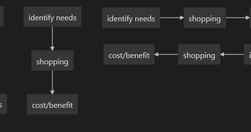
Mermaid lets you "creating diagrams using simple markup language... for quickly jotting down a sequence of steps or a set of interconnected relationships. The above diagrams are created with just a couple of lines of code. Other types include pie charts, sequences, gantt, etc.
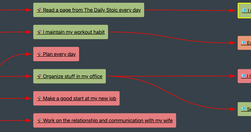
David's "journey trying to visualise relationships in my Obsidian notes" passed via various approaches, including d3, as he tried to create diagrams encapsulating relationships between nodes.He then stumbled upon the obsidian-excalidraw-plugin ... [which] automatically generate Excalidraw diagrams with its Excalidraw Automate feature... with Datav…
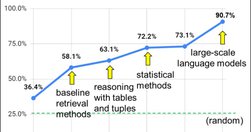
When James West "joined a small wave of users granted early access" to the new Bing (I'll call and tag it "BingGPT"), powered by the same LLM behind ChatGPT, which is "a great party trick ... powerful work tool, capable of jumpstarting creativity, automating mundane tasks", he soon "noticed strange inconsistencies... dangerously convincing falseho…
Interesting, illuminating (but contested) metaphor for thinking about LLMs from one of my favourite authors, Ted Chiang:"Think of ChatGPT as a blurry jpeg of all the text on the Web. It retains much of the information... but, if you’re looking for an exact sequence of bits, you won’t find it; all you will ever get is an approximation... nonsensica…
"Micro.blog can now cross-post to a Mastodon user account... Your custom domain on Micro.blog can now be ActivityPub-compatible, so that you can follow and reply to Mastodon users directly on Micro.blog ... someone can follow your blog posts".As a result "you can consolidate your identity and posts back to your own blog at your own domain name..…

Is ChatGPT creator OpenAI "a potential Google slayer. Why look up something on a search engine when ChatGPT can write a whole paragraph explaining the answer?" It's very capable, but "struggles to distinguish between truth and falsehood... often a persuasive liar... a bit like autocomplete on your phone... trained on pretty much all of the web... …
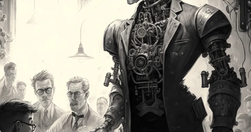
ChatGPT... is going to change our world much sooner than we expect, and much more drastically

Mastodon is "subtly designed to reduce the huge, viral surges of attention we see on Twitter" and others, which have "deformed people’s behavior... coaxed people to constantly try to hack the attentional marketplace... incessantly making posts ... operatically theatrical... enrage ... [other] high-voltage reaction".Hence “antiviral design”, of whi…
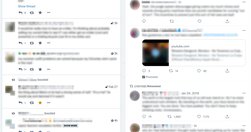
4 ways Mastodon doesn't optimise for enragement.On Mastodon’s "home timeline... posts don’t have metrics ... you have to click through ... makes you judge a post first by its content, rather than the score attached to it... the whole dynamic [being "ratioed"] doesn’t exist... leads to more thoughtful engagement rather than ... Liking every post by…
A new app and protocol to give "people full control over their interest graphs ... there was no standard, decentralized repository for online media and its derivatives... culture that is readily available for anyone to annotate, remix, compile, create new editions of or link together in archives. Mediagraph [protocol] will let developers build on …
Via FotL I discover "Canonical Debate Lab (CDL)... researchers, developers, and system thinkers who have independently been working on collective intelligence systems for several years... goal is to aggregate contributions of diverse stakeholders into a unified information space, which can be accessed through multiple views... tailored to a specif…
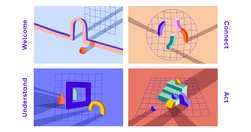
New Public "spent two years reviewing the literature and talked to over 100 experts from disciplines ranging from social psychology to urban planning about the qualities of flourishing public, or semi-public, spaces" for their Building better digital public spaces report. The goal: "to support engineers, designers and builders who want to create m…

"I first decided to try scribing the Betaworx Render session on Plexus using Obsidian and try publishing it via GitHub (context). That didn't work, so when I saw [[rtnf md]] I thought I'd give it a whirl... the idea [of Plexus] is simple:post your thoughts into a defined shared brain on Plexus - eg : https://render.plexus.earth/the AI surfaces rel…

Systems with Design from Trust: assume most (not all) people have good intent."initially feel counterintuitive, even risky...social: they rely on human relationships. appealing: once you wrap your head around them, you want more."The discomfort is a symptom of how today's default setting is mistrust: "we’ve internalized the assumption that humans …

Good starting point on pattern languages, ends with useful links.As a definition of what a pattern is: "a proven solution to a problem in a context. Each one documents a reusable solution, encapsulates knowledge about successful practices, and provides information about its usefulness and tradeoffs... Connected sets of interrelated patterns build…
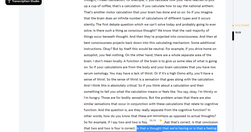
A short experiment on getting the most out of podcasts by using speech-to-text engines to create rtanscripts. TL:DR:Welder’s excellent and free; Otter.ai’s got some amazing features, but it’s pricey; just forget Google.
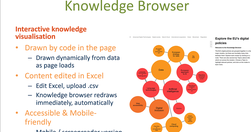
An interactive knowledge visualisation providing a graphical overview of interrelated online concepts, edited dynamically with an Excel file. Featuring an accessible version driven by the same content.
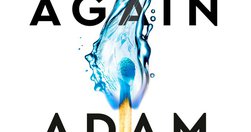
A YANSS interview with Adam Grant, author of Think Again: The Power of Knowing What you Don’t Know. Generally an "extensive exploration of how to rethink your own thinking", including his WorkLife podcast interview of Margaret Atwood on procrastination.(When annotating a podcast I really like a transcript, but there was none for this episode so I …
We've tweaked the navigation phrase so that the default is to show "All the" resources on your home page, rather than just "The Best". More tweaks are on the way.
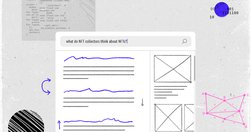
Basically this piece starts to unpack for me my ideas of what millions of Hubs networked together and processed by AI would offer the world in terms of content discovery:With "tools like Notion, Airtable, and Readwise ... people are aggregating content ... reviving the curated web. But at the moment these are mostly solo affairs... fragmented, poo…
Covers "a new class of apps called “Integrated Thinking Environments (ITEs)”... [and] NOTE framework, used to describe the specific feature sets ITEs provide... examples and some future directions".The term ITE riffs off "Integrated Development Environments... provide developers a comprehensive set of tools ... a kind of augmented cognition for pr…

Really good but short piece on how most "Note-taking apps have ways they want you to work, a grain you should follow. Except Obsidian... an Integrated Development Environment (IDE) for text files ... [not] a note-taking app... an integrated thinking environment. ".Hence you have to set it up to support the way you want to work, rather than going…

"the underlying problem is stubbornly intractable"Great piece, although I'm unsure that "a great proportion of the variance in “knowledge management” effectiveness across individuals is genetic", it is true that:productivity geeks exist, develop their system and then try to sell it.speaking from experience, it is really, really hard to get other p…
"Hitting “publish” on this, my first blog post on Knowledge4Policy (K4P), is a special moment for me. I’ve helped create a few online communities for the European Commission (I launched my first in February 2002, so I just missed that particular anniversary), but K4P may be the most important."
Loading more...
Relevant Overviews
- Communication Strategy
- Content Strategy
- Knowledge4Policy
- Fediverse
- Online Strategy
- Online Community Management
- Social Media Strategy
- Content Creation & Marketing
- Online Architecture
- Digital Transformation
- Change & Project Management
- Thinking tools
- Personal Productivity
- Innovation Strategy
- Surveillance Capitalism, Social media and Polarisation (Overview)
- Communications Tactics
- Psychology
- Social Web
- Media
- Politics
- Communications Strategy
- Science&Technology
- Business
- Large language models